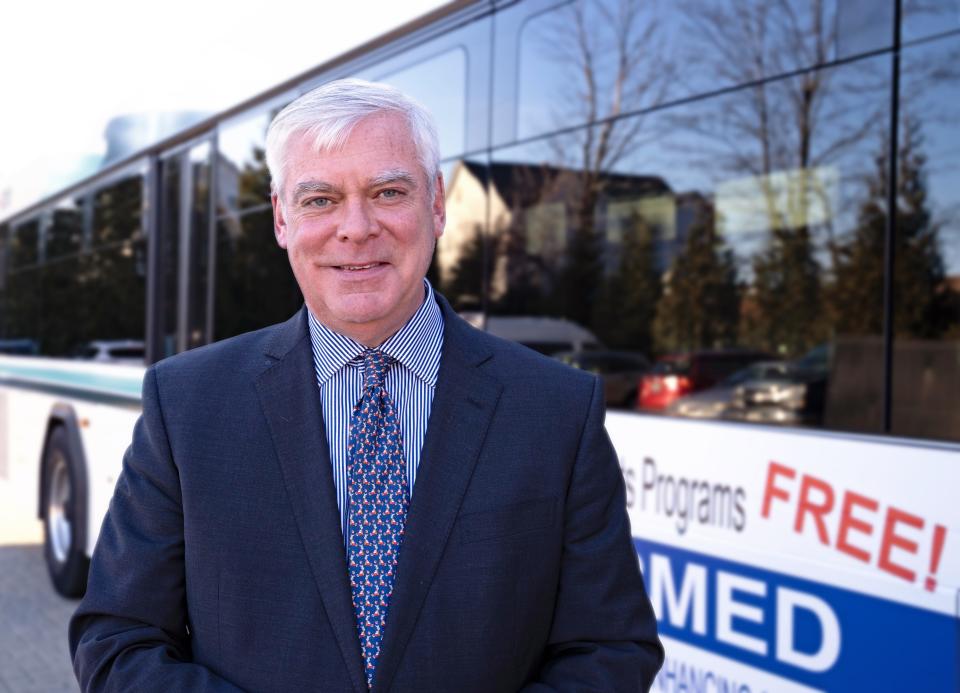Ruggerio backs off RIPTA-RIDOT merger, for now. Here's what he proposed.
The Rhode Island Public Transit Authority would keep its independence under a new, scaled back agency overhaul plan from Senate President Dominick Ruggerio, but the state Department of Transportation would gain new oversight power over the bus operator.
Late Wednesday afternoon, a new version of Ruggerio's legislation to fold RIPTA into the DOT – one that would abandon the merger but make the director of the DOT chairman of the RIPTA board – was put before state lawmakers.
"The Senate president continues to believe that RIDOT should oversee all transportation matters in our state, including public transit," Ruggerio said in an email. "While he continues to work towards that ultimate goal, naming the RIDOT director as chairman of the board of RIPTA is an acceptable first step for the time being."
More: Despite calls to replace him, RIPTA gives Avedisian a two-year contract

Transit advocates have railed against the idea of folding RIPTA into RIDOT, which dedicates most of its resources to highway building and maintenance.
They welcomed the decision to abandon the merger on Thursday but are still opposed to having the RIDOT director made the board's chairman. RIDOT Director Peter Alviti Jr. is a member of the RIPTA board but is not the chairman.
Legislation is latest in push to bring RIPTA under DOT
Ruggerio in February called for RIPTA to be subsumed by the DOT and RIPTA CEO Scott Avedisian to be replaced.
After a compromise appeared to have been reached on a one-year Avedisian extension, last week the RIPTA board voted to renew Avedisian's contract for another two years, frustrating some labor leaders.
In a news release Thursday, Rhode Island Transit Riders wrote that RIPTA is much more open to public comment than is the DOT.
"In contrast, not only does RIDOT have no formal mechanism for public input, its current leadership has eliminated the quarterly 'Roundtables' that previous directors scheduled with community groups during the Almond, Carcieri and Chafee administrations," the Transit Riders wrote.
"RIDOT is auto-centric and has not been supportive of bus transit," they added. "We think by many measures RIPTA is doing a good job given its relatively low level of funding."
In arguing for new leadership at RIPTA, Ruggerio pointed to the agency's facing a $30-$40 million budget gap starting next year, with Avedisian having not spelled out a detailed plan or request for how to fix it.
RIPTA supporters counter that the solution to the agency's funding woes is plainly obvious: more state funding.
"With all due respect, we view this legislation is a solution in search of a problem," John Flaherty, deputy director of GrowSmart RI said. "RIPTA isn't broken – it's severely underfunded. This bill is fiddling while Rome burns. Instead, we wish it was about addressing RIPTA's pending fiscal cliff, something that transit agencies across the country are grappling with as federal COVID aid runs out."
The struggle to rescue and control RIPTA comes as the General Assembly considers whether to continue a fare-free pilot program on the R-Line or expand it to the whole system.
It is not clear exactly where RIPTA stands on making the statewide bus system fare free.
During a Senate Finance Committee hearing earlier this month on Sen. Meghan Kallman's bill to make the system free, Avedisian said he "supports" the idea, but that "we just need to worry about the impact of free fares on our budget."
But in written testimony on the House version of the bill, introduced by Rep. Leonela Felix, D-Pawtucket, Avedisian wrote that RIPTA "wishes to respectfully note its opposition to this legislation."
This year "in addition to $12.3 million in systemwide passenger fares. RIPTA expects to receive $11.6 million of fare revenue through third-party contracts with businesses, colleges and universities and other organizations," Avedisian wrote to the House. "Rescinding RIPTA's ability to collect passenger fares would jeopardize these contracts and, in doing so, inadvertently remove one of the most proven tools for growing transit ridership."
Testifying in person the same day the written testimony was submitted, Avedisian said "we don't oppose" Felix's fare-free bill. "We just want you to think about it in the totality of our overall budget. It does leave about $26 million it would cost the agency."
This article originally appeared on The Providence Journal: RIPTA will stay independent in new proposal, not go under RIDOT

